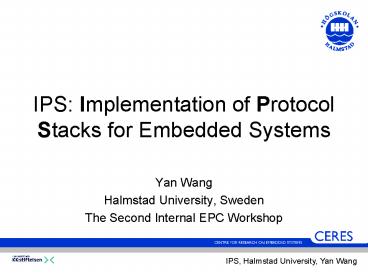IPS: Implementation of Protocol Stacks for Embedded Systems - PowerPoint PPT Presentation
1 / 10
Title:
IPS: Implementation of Protocol Stacks for Embedded Systems
Description:
PADDLE: A Data Description Language. Simple Packet Types. Layered Packet Types ... PADDLE. The contributions of PADDLE: A rich language for describing packets ... – PowerPoint PPT presentation
Number of Views:33
Avg rating:3.0/5.0
Title: IPS: Implementation of Protocol Stacks for Embedded Systems
1
IPS Implementation of Protocol Stacks for
Embedded Systems
- Yan Wang
- Halmstad University, Sweden
- The Second Internal EPC Workshop
IPS, Halmstad University, Yan Wang
2
Motivation
QoS
IPS, Halmstad University, Yan Wang
3
Protocol Stacks for Embedded Systems
- Challenges
- Difficult to program
- Resource constraints
- Main concerns
- Computer resources awareness
- Programming efficiency
- Opportunity
- A potentially large payoff for investing in a
tool to support protocol stack implementations
Memory
Energy
Develop Time
IPS, Halmstad University, Yan Wang
4
IPS
- A Domain Specific Language to facilitate
Implementation of Protocol Stacks - Addressing the protocol
- stack as a whole
- Providing events time abstractions
- Evaluation
- Performance of compiled-code
- Cost of development process
Paddle
IPS source code
Modular architecture
IPS compiler other tools
Type system
Compiled C code
IPS runtime system
OS/HW
IPS, Halmstad University, Yan Wang
5
PADDLE Motivation
- Processing packets
- Tedious and error-prone
- Difficult to be related to the specification
- Hard to debug and modify
- Solution
- Describe packets by dependent types
- Compile type description to packet processing
functions
IPS, Halmstad University, Yan Wang
6
PADDLE A Data Description Language
- Simple Packet Types
- Layered Packet Types
IPS, Halmstad University, Yan Wang
7
The Generated Library
PADDLE program
PADDLE compiler
In-memory representation
Parsing function
Writing function
IPS, Halmstad University, Yan Wang
8
Compact Packets
Byte Oriented
Bit Oriented
P_Type
P_ID
P_ ID
P_Type
Originator
Originator address
address
We save two bytes
IPS, Halmstad University, Yan Wang
9
PADDLE
- The contributions of PADDLE
- A rich language for describing packets
- A tool that generates packet processing functions
- Operations for layering packets
- Optimizations suitable for Sensor Networks
IPS, Halmstad University, Yan Wang
10
Thanks for your attention!
IPS, Halmstad University, Yan Wang































